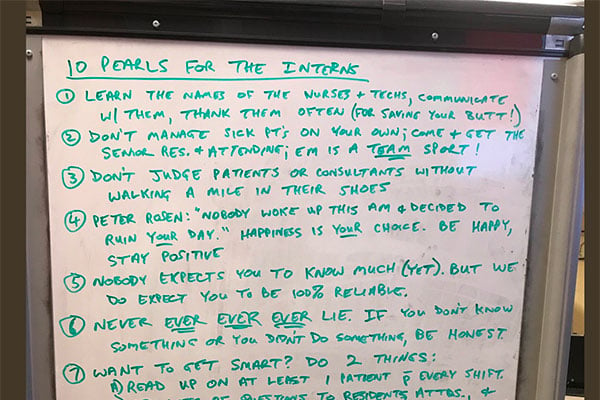10 Pearls for Success!

Friday Flashback: Amal Mattu’s 10 Pearls for Success in Residency
Originally Recorded: August 1, 2019
In this episode, Dr. Jessie Werner interviews Dr. Amal Mattu about his 10 Pearls for Success! It may be geared towards Interns, but everybody will benefit from this advice!
Host
Jessie Werner, MD
University of California San Francisco – Fresno
Fellow - Emergency Medicine Education
@JessWernerMD
EMRA*Cast Episodes
Guests
Amal Mattu, MD, FACEP, FAAEM
Professor of Emergency Medicine and Vice Chair of Academic Affairs, University of Maryland SOM
Hospital Affiliation: University of Maryland
Twitter: @amalmattu
More Info: EMPower: Sharing Our Stories
Overview:
In this episode, Dr. Jessie Werner hears Dr. Amal Mattu’s 10 Pearls for Success in Residency. These pearls were developed for Interns but will benefit any level of training. Follow this advice and you’re sure to be a star resident.
Key Resources:
Key Points:
- Learn the names of the Nurses and Techs! Thank them often. Let’s face it, they spend more time with the patients than we’re able to. They know when something’s not right and they will catch things that will help you.
- Don’t manage sick patient’s on your own. EM is a team sport. Always notify your senior or attending about a sick patient. They’ll respect your good judgment and trust you more!
- Don’t judge patients or consultants without walking a mile in their shoes. Everyone has their own story. Be empathetic and compassionate - it will make you feel better too.
- Peter Rosen “Nobody woke up this morning and decided to ruin YOUR day.” Happiness is you choice. Be happy, stay positive. Enough said?
- Nobody expects you to know much (yet). But we do expect you to be 100% reliable. Residency is a time of learning! It’s ok to not know things but show up on time (or early), follow through on tasks, and give everything your best effort.
- Never ever, ever lie. If you don’t know something (or didn’t do something), be honest. This is where your reputation is made. You will gain the trust of your colleagues and attendings by always being honest. We don’t care that you don’t know or forgot to do something. Just admit it and offer to fix it!
- Want to get smart? Do two things:
- Read up on at least one patient per shift
- Ask lots of questions
Learning in residency can feel overwhelming. A great and manageable way to learn is by taking it one step at a time by reading about one thing you saw after every shift. Take advantage of your attending’s and consultant’s knowledge! Ask why they chose Roc over Succs or keppra over phenytoin…
-
Never be arrogant. You’ll be wrong many times in your career. Learn humility now. Even the best, most seasoned physicians have to look things up. Overconfidence leads to errors. Stay humble.
-
Eat and hydrate during every shift. You won’t be able to be the best for your patients if you haven’t taken care of yourself. We promise you won’t lose points for having a snack or going to the bathroom. Eat, drink, pee!
- Never forget what a privilege and responsibility it is that people who don’t know you ask for your help on the worst day of their life. You went into medicine to help people. Hold onto your compassion and empathy. Remember what an honor it is to have people place their trust and confidence in you as an Emergency physician.
Other Tips
If you’re interested in becoming an ECG expert like Amal Mattu, the EMRA EKG Guide is a great place to start!
Related Content

Oct 09, 2019
Critical Care Alert: Fluid Overload and Mortality in Adult Critical Care Patients
Fluid overload has not been clearly defined in the critical care arena. In situations where patients have renal, cardiac, and pulmonary dysfunction, commonly seen in the ICU, large volume fluid therapy can have adverse effects.






